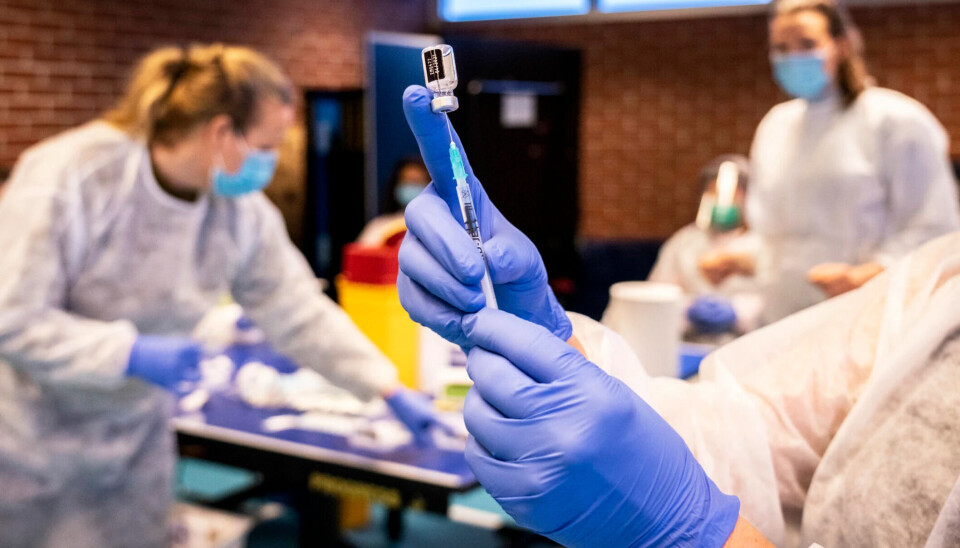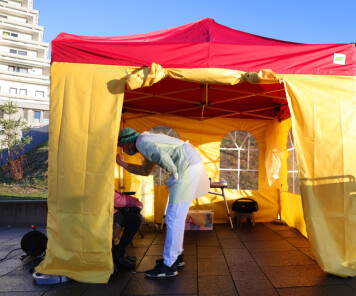
Misinformation and conspiracy theories may have caused fewer immigrants to take the Covid-19 vaccine
Researchers have investigated what may have contributed to fewer immigrants taking the Covid vaccine.
Lack of information, fear of side effects, misinformation and conspiracy theories, as well as lack of trust in information from the authorities are highlighted as reasons that may have had an effect on the vaccination rate being lower amongst immigrants in Norway.
A study in the Journal of the Norwegian Medical Association from 2021 shows the differences in vaccination rates between Norwegian-born, foreign-born and Norwegian-born with foreign-born parents.
The proportion of Norwegian-born people above the age of 18 who had been vaccinated with at least one vaccine dose against Covid-19 was 94 per cent.
The proportion for foreign-born was 73 per cent, and 82 per cent for Norwegian-born with foreign parents.
Information from their home countries
Naima Said Sheikh is a research fellow at the Department of Public Health Science at NMBU and the main researcher behind a new study which is also published in the Journal of the Norwegian Medical Association.
She explains that many immigrants received information about the vaccines from their home country and on social media.
“Many of the informants said outright ‘I don't watch Norwegian TV, I don't read Norwegian newspapers’, so the information they received was based on conspiracy theories and misinformation from their home country,” she says.
This included things like if famous people in their home country died from the vaccine, that it could affect fertility, or that there were microchips in the vaccine.
“Many immigrants are more informed about what happens in their home country than what happens in Norway,” Sheikh adds.
There were also several of those who took part in the study who felt that they did not get enough information. Sheikh says that several informants with underlying illnesses had asked their GP about any side effects and which of the vaccines was best for them.
“Some immigrants felt that doctors were very cautious in giving such answers. So there were people who became sceptical about the vaccine because they believed they had not received any professional health advice,” she says.
Lack of trust
Sheikh tells sciencenorway.no that many immigrants had more trust in their GP and the health authorities, than in politicians when it came to information about the Covid-19 vaccines. Much of the information from the authorities was also interpreted politically, rather than neutrally and academically.
“If there had been other experts or health personnel who had disseminated information about the vaccines, people would have had a different attitude. That's what we assume,” she says.
Sheikh points out that using people from immigrant communities to convey professional information about the vaccines could have had a positive effect.
“When you ask immigrants who they see as role models, the answer is often other immigrants,” she says.
The study shows that trust in the Norwegian authorities amongst immigrants increased when the AstraZeneca vaccine was removed from the vaccination programme.
“People then got the feeling that the authorities were looking after them,” Sheikh says.
Need for more research
In an article published in the Journal of the Norwegian Medical Association, psychologist Siv Hilde Berg writes that trust helps us make decisions. She further explains that the need for trust stems from a lack of information.
In the new study, the researchers also point out that it is important to ensure that knowledge-based information about vaccination is communicated clearly to all parts of the population. They write that unavailable or missing information from professionals can contribute to the spread of misinformation and conspiracy theories.
Naima Sheikh emphasises that there is a need to research the effect of the information initiatives the authorities had during the Covid-19 pandemic.
“The authorities had many different information initiatives, but nobody really knows their effect,” she says.
———
Translated by Alette Bjordal Gjellesvik.
Read the Norwegian version of this article on forskning.no
Reference:
Berg, S.H. Health communication in times of uncertainty, Journal of the Norwegian Medical Association, 2023.
Kraft et al. COVID-19 vaccination coverage by immigrant background, Journal of the Norwegian Medical Association, 2022.
Sheikh et al. ‘Vaksineusikkerhet blant innvandrere under covid-19-pandemien – en kvalitativ studie’ (Vaccine uncertainty amongst immigrants during the covid-19 pandemic – a qualitative study), Journal of the Norwegian Medical Association, 2023. Summary.



































